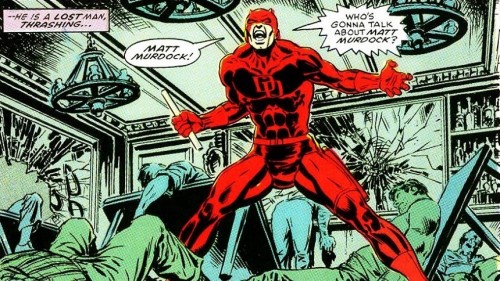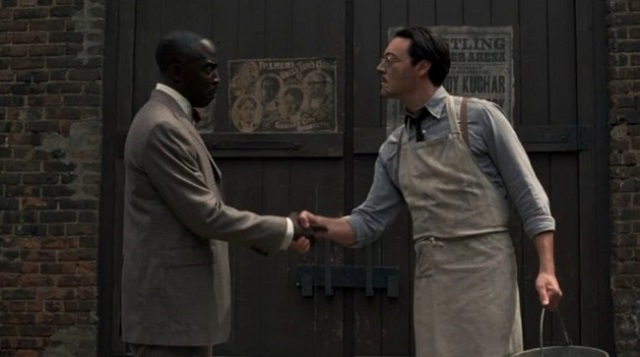 Daredevil: Born Again (Daredevil #227-233) (1986)
Daredevil: Born Again (Daredevil #227-233) (1986)
Written by Frank Miller
Penciled by David Mazzucchelli
Colored by Christie Scheele and Richmond Lewis
Lettered by Joe Rosen
Published by Marvel Comics
The main crux of any superhero comic book is to depict the eternal war between good vs. evil in anyone of its myriad of forms. This is why most of us read comic books. It’s an innately understandable medium that conveys its own mythology through a dialogue that we can automatically make sense of. There is right and there is wrong, good and bad, heroic and villainous. This binary logic, while not completely flawed, is how most people not only make sense of the world at large, but also how they reconcile their own existence with that of their surroundings and experiences. From the menial conflicts we face on a daily basis, like being cutoff by some jerk off, who then goes 15 MPH below the speed limit, to more important crises like an ugly custody battle or all out warfare, the way that they we quantify these experiences is through the binary nature of conflict. There is the protagonist, the self, and then the antagonist, someone who impedes on your ability to complete a task. Comic books understand this aspect of human psychology and reflect it back to the most entertaining degree. For most superhero comic books, not only does there need to be a central conflict, but there needs to be a sense of evil. Anyone who gets in the way of you completing a goal is automatically a villain in your life for that brief instance. They may not be evil, but they’re certainly an antagonist at that specific point in time.
A villain is key to the fabric of a story and also to the very fiber of a hero. After all, why read a comic about a superhero who can never be antagonized or bested? Some comics, particularly ones written by Alan Moore, succeed because they make the villains triumph. Other comics, like Geoff Johns’ Green Lantern, blurs the lines between the purported good guys and bad guys, and therein lies its success. And still others, like Daredevil: Born Again, succeed because the evil that the hero must triumph over is as black as tar and as absolute an evil that could ever possible exist. At it’s most basic, Born Again is a tale about the triumph of righteous men over an impregnable, absolute, and omnipotent evil that seeks to propagate inside them like some uncontrollable cancer.
Beyond that, Born Again also serves as both the Revelation to Matthew Murdock as well as his re-Genesis. In the story, Daredevil is picked apart more intensely and more thoroughly then ever before or since. After discovering his secret identity, the Kingpin, Wilson Fisk, proceeds to dismantle the life of the the purest and most decent soul he has ever encountered. Like some sinister octopus, the Kingpin has his extended tentacles seep into every aspect of Murdock’s personal life. Fisk bribes Nick Manolis, a straight-laced cop, to make false accusations against Murdock, which gets him disbarred. He also manipulates bank records and bills, freezes Murdock’s bank account, and then blows up his home.[1] This desire to knowingly and maliciously inflict such tortures is what makes Fisk not an evil man, but rather an engine of evil, something that cruelly exudes evil. When applied to Wilson Fisk, evil is not merely an adjective, but a noun.
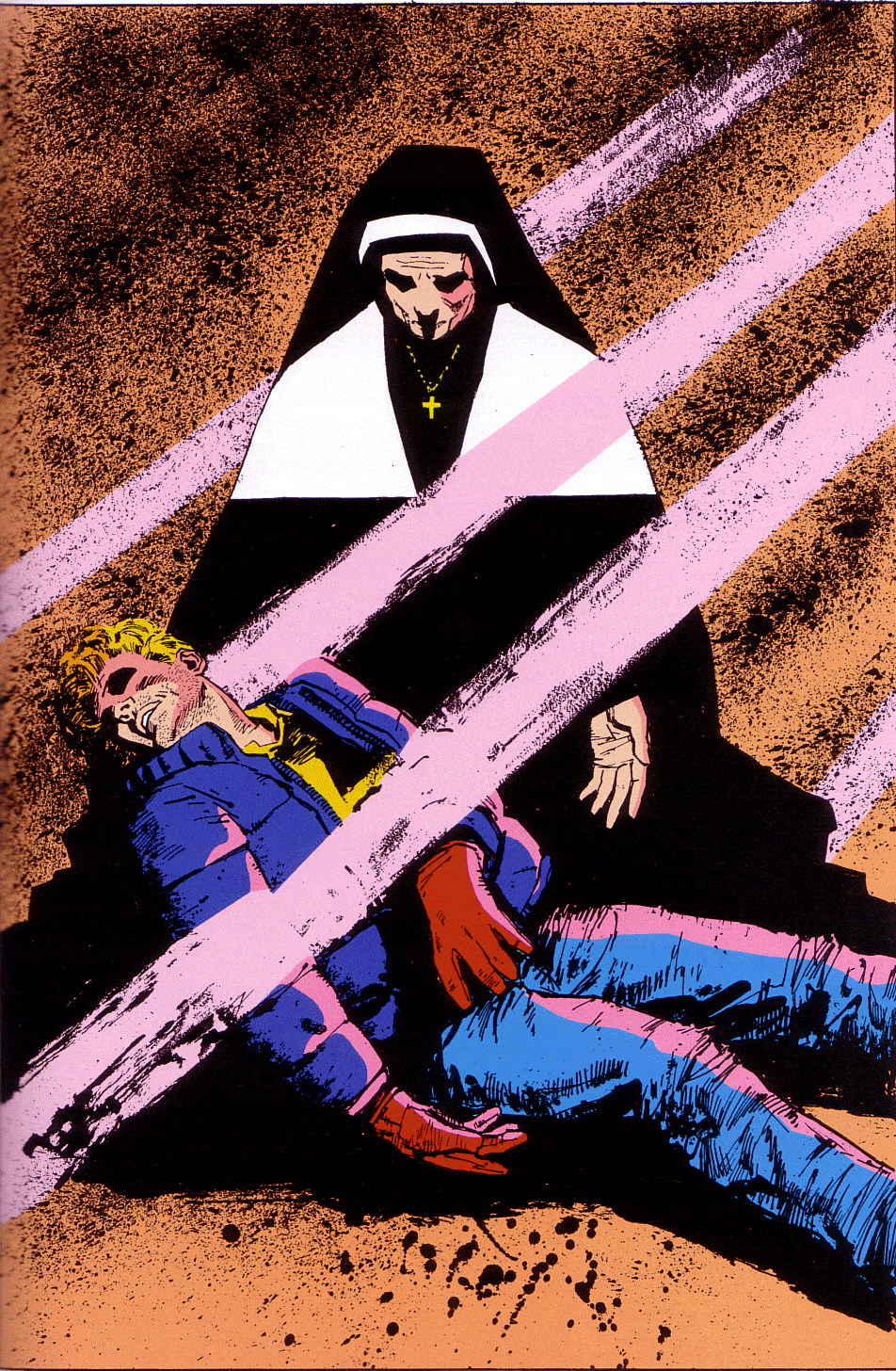
Despite being a story grounded in Christian imagery and references[2], Born Again actually starts off more like a film noir with Karen Page sitting in a smoke filled room desperate for a heroin fix. With nothing to offer in exchange for her next high, she decides to sell the only thing that has any remaining value to her: Matt Murdock’s soul. The revelation of who Daredevil is underneath his mask soon makes its way across country to the Kingpin, who decides to test the validity of this information by systematically destroying Murdock’s personal life. What should be most jarring about this, beyond the fact that Kingpin has everyone who heard the news before him killed, is that in the event that the information was wrong, Fisk would have summarily ruined a completely innocent man’s life based on rumors started by a drug addicted porn star. That’s the kind of absolute wickedness that writer Frank Miller throws Daredevil’s way. Those are the little nuances that Miller drops to stress the point that Fisk isn’t merely an evil man, he is evil.
Because of all the stresses and ruination wrought on him, Matt starts to go insane casting aside his friends and rationality. For the first half of the story, Murdock is more akin to a Job that failed to endure God’s trials. This culminates in Daredevil’s only battle with Fisk in which he’s pulverized and almost killed. What Miller was implying with their premature confrontation is that in order to resist or combat a seemingly omnipotent evil, one needs hope, clarity, and purity of heart, lest evil triumph as Fisk does. Going into their bout, Murdock has nothing but rage and revenge on his side, both of which are unable to stymie the festering malignance that is the Kingpin.
From there, Matt is thrown into the river (where he narrowly escapes drowning), hit by a car, collapses from sickness, and then stabbed by a couple of street thugs. These three falls are to parallel the three times that Jesus Christ fell while carrying the cross to Golgotha. It isn’t until Matt is taken in by a nun who nurses him back to health physically and spiritually that he can become born again. It’s only after he endures the worst experiences of his life that he can then be rebuilt stronger, more resilient, and better equipped to battle the evils that the Kingpin will hurl his way.

Despite being Fisk’s main target, Daredevil is not the only victim of the Kingpin’s machinations. Being a devourer of righteous souls, Fisk is an evil that replicates itself inside the souls of the virtuous. By forcing certain characters to sell a piece of their souls to him, he holds a certain amount of influence and power over their actions. Through threats of intimidation, he thrusts cowardice on reporter Ben Urich, preventing him from writing an article exposing Kingpin’s plans. Through bribery, he corrupts Nick Manolis, who winds up selling his soul for but naught. Through coercion he forces Melvin Potter (the former Gladiator), now trying to make an honest living as a reformed criminal to assist in his plan to destroy Devil of Hell’s Kitchen. And most impressively, through blackmail, Kingpin is able to strong-arm the United States military into lending him a highly classified and mentally unstable super-soldier to wage as his proxy in his war against Daredevil. Proving him to be the omniscient generator of evil that he is, nothing is beyond the shadowy touch of Wilson Fisk.
But given the hell that Fisk puts all these characters through, it’s only when they learn to lean on each other and feed off of the inspiring righteousness of one another that they can hope to vanquish Wilson Fisk. After forsaking his friends, it isn’t until Matt Murdock is taken in by Sister Maggie that he begins to regain his sanity, his spirituality, and the strength he needs to carry on his life. After making her way across country to find Daredevil, Karen’s salvation comes in the form of Foggy Nelson, who serves as her last lifeline. Melvin Potter is reassured that all will be made well by Daredevil. After the deal he made with the Kingpin soured, Nick Manolis seeks out Ben Urich to tell his story and the truth behind his lies to frame Matt Murdock. In turn, Urich is then inspired to write Manolis’ story, implicating the Kingpin in a plot to destroy Matt Murdock. For all his machinations, Fisk is never able to land that one final killing blow that would snuff out the righteousness that he’s so intent on destroying because his targets all band together to resist his evil.
They say that all it takes for evil to flourish is for good men to do nothing. In Born Again, Daredevil and his allies choose to take action and stand up to wickedness whatever the cost may be. Despite surviving all that the Kingpin has thrown at them and never succumbing to despair or ruin, Fisk has one final ace in the hole to throw at the newly reborn Daredevil. Blackmailing those in the military on his payroll, Fisk is able to procure the services of Nuke, a mental unstable super soldier designed to be the Captain America of the Vietnam War. Manipulating Nuke’s warped sense of patriotism, Fisk unleashes Nuke on Hell’s Kitchen with the sole task of razing it to the ground.
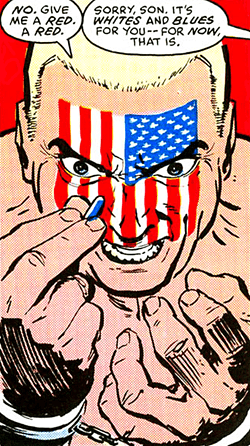
With Nuke, Frank Miller is able to add a new fascinating layer to Born Again that moves away from the spiritual and into the realm of politics. Nuke is the product of a time where America was incredibly fractured and schismatic. There were disagreements over the Vietnam crisis, a youth counterculture movement, and a wave of progressivism that was opposed by the status quo of the past. Unlike the WWII era that inspired Captain America, Nuke was born into a nation in the midst of a tumultuous cultural war. By the 1960s, no longer was there a distinct sense of moral absolutism where there was an objective good guy and an objective bad guy. Instead, the left and the right were engaged in a war of words where one side would strive to discredit the other. Without compromise, both sides sought their own unilateral agenda for the nation. Caught in the middle, Nuke was abused by the right while vilified by the left. Working for a country that exploited him for a people that abandoned him, Nuke was a weapon used to inspire fear and cause destruction. Whereas Captain America was meant to be a symbol of America’s ideals and a representation of our freedoms, Nuke became an expression of the darker side of America. Nuke was used not to defend the nation, but to oppress other nations and exert American political dominance. Much to his own downfall, Nuke was a product of his time. Through Nuke, Miller is critical of both a conservative government and the liberal media.
Captain America’s appearance in Born Again connects the political aspect of Born Again with the religious in a sense merging church and state within this story. Despite being employed by the Kingpin, Nuke reveres Captain America, who in turn feels nothing but infinite pity and mercy for Nuke, the man who became a twisted version of Steve Rogers. Being the ultimate paragon of virtue, it’s Captain America who vanquishes Nuke and halts his rampage. Captain America is morally perfect, and unlike Daredevil who treats Nuke with violence and rage, Rogers sees this bastardized version of himself with sympathy and is more enraged with the government that created him.
The reason why it’s Captain America who is able to defeat Nuke and contain the damage that he caused is because in a very real sense Captain America had been born again as well. During Operation: Rebirth, Steve Rogers became reborn as Captain America, the living symbol of all the finer ideals championed by the United States. Only he was able to resist the distorted version of himself. Whereas Daredevil is a man with flaws, struggling to be as good and just as he possibly can be, according to Miller, Rogers has already reached that state of apotheosis. Through his almost perfected morality, Rogers is able to exert his own will over politics and clandestine secrets.
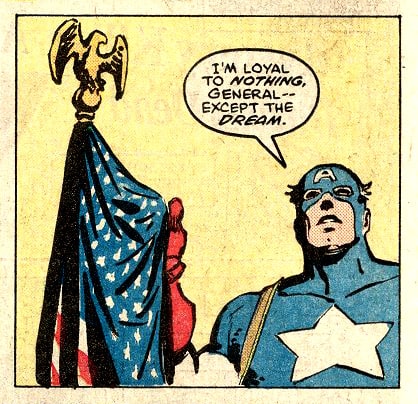
Nuke is one of the most riveting and layered characters that Frank Miller has ever created, a fact that seemingly contradicts the character’s simplicity and superficial musings. The sole addition of Nuke is directly responsible for taking Born Again to such an unexpected yet riveting climax. Throughout the course of the story, Miller carefully crafts a tale rife with religious imagery and allusions, aspiring to imbue it with a sense of spirituality. Despite appearing in only two issues of the story, Nuke adds secular overtones to the story, moving it away from spirituality and to a worldlier grounding. Born Again then becomes less about the eternal battle between good and evil, but more of a political statement by one of the most politically outspoken creators in comics.
With Born Again, the greatest Daredevil writer gives readers the quintessential Daredevil story. It’s a story that has a soul to it, overflowing with literary themes, and social and political commentary. Miller’s writing is probably the best it’s ever been and artist Dave Mazzucchelli is on the top of his game. Miller writes a crazed Matt Murdock phenomenally (Probably because he can pretty much only write crazy people.), Nuke is imposing and horrific, and Captain America is so well written that it’s a crime that Miller was never given an opportunity to write the character’s title. Daredevil: Born Again is a great comic book that does everything perfectly. It’s an incredibly nuanced story of good vs. evil, but can be analyzed on a myriad of different levels. The most important thing about Born Again is that it demonstrates that absolute evil can be combated and defeated wherever the smallest sliver of hope remains.
[1] All within the very first issue of the story no less.
[2] Culminating in a recreation of La Pieta on the last page of issue 229.
